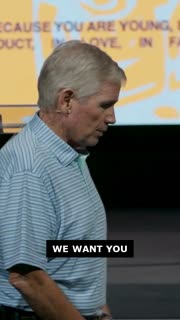Identity, Prayer, and Women's Roles in Ministry
Devotional
Sermon Summary
Bible Study Guide
Sermon Clips
1. "Men, I don't want you to be defined by your manliness, by your brute strength, by your machismo. You know, I know some of you work out a little bit at the gym and, you know, you like to show those guns. I love, you know, I'm jealous. I wish I had, you know, my sleeves are busting out to here. But it's just this that busts out. There's nothing wrong with having big guns, guys. It's just don't look down on those who, and don't define yourself. But you are a man consecrated to God, called apart for his work." [00:43] (-1092 seconds)
2. "Nothing, nothing should be impossible for them, right? I mean, we just believe for big things for them and trust God for that. Hey, we're in a sermon series on the book of 1 Timothy. So we already had two of the series. We're on chapter two today. We sort of have an overview. Two weeks ago last week, we talked about chapter one. Pastor Derek shared that. And this week we're on chapter two. It's only 15 verses. That's the good news. The bad news is seven of those 15 are the most difficult to explain in the entire Bible. But we're gonna get to it, okay?" [02:12] (39 seconds)
3. "So he's saying, look, you're gonna face some troubles. You're gonna face some difficult times. But remember, you got that prophetic word from God in your heart and in your life. Don't forget it. Don't cast it aside. Don't move it on. You keep that, hold fast to that thing because it's gonna be important for your life so you can wage the good warfare. You can keep the faith and you can have a good conscience. That's a very important theme for Paul as he writes the letters of the New Testament is that we have a good conscience." [05:10] (34 seconds)
4. "If you think about today, when you walked here today into this building, you weren't checked at the door for your license and for your papers. There's no National Guard out there monitoring who's coming and who's going. No, you came in to a free place to worship. And the government officials all the way to the highest official in our land back up our ability to come into a free space to worship God freely. And so, so for that reason, we ought to pray for them. And we ought to thank God for them." [07:41] (38 seconds)
5. "It's time to quit criticizing, mocking either the current president or the one that you wish was getting in there. It's time to stop all that. And even though you might not agree with their policies, even though you might not agree with their demeanor or their personality, or their ego, even though you might not agree with their worldview, even though you might not agree with what they've allowed or not allowed, the Bible leaves no room for interpretation here. Pray for them. Pray for them." [09:50] (34 seconds)
6. "A mediator is somebody who gets in the middle between two fighting, warring parties. And then he makes peace and brings them back together. Well, Paul was able to make peace, excuse me, Jesus was able to make peace as our mediator by giving his life for us in our behalf. And so he is our mediator. He intervenes. He intervened between God and man in order to make peace and friendship between the two." [11:44] (30 seconds)
7. "So he's saying, hey men, I want you to be able to come into the assembly and to lift your hands. Hands that are holy, what does that mean? Hands that are, you're consecrated to God. Set apart for God. You lift hands that are holy to God and pray then without anger and without disputing. Come into this place and not being defined by your macho attitude or your ego, but you're being defined here by your consecration to God. So remember that. Keep that in mind, guys, when you come into this place." [15:40] (44 seconds)
8. "So I want to just encourage you in that, that, man, that woman is the God figure. He is, she is the provision of God himself that he made to woman. So if we start there and we go through the new Testament resurrection, who was the first person to see Jesus, the resurrected Jesus? Anybody know Mary, right? Mary Magdalene. She's the first person to see him. All four of the gospels testify to that." [32:37] (34 seconds)
9. "We believe, secondly, that there's neither male nor female in Christ, living a life in the spirit of God, that we don't make levels for gender people. There's just, hey, we're one in Christ. We are complementarian to a degree. Complementarian is a theology that says men and women are both honored and loved by God equally, but they have different functions. We believe that men are different from women. We're not the same. We're totally different in a lot of ways, but we're alike in a lot of ways too." [49:04] (38 seconds)
10. "We want you ladies, I'm talking to you, we want you to do everything that God has called you to do. We want you to be everything that God called you to be. Men, we want you to do everything that God has called you to do. Men, we want you to be everything that God has called you to be and we want to create a community where we can safely learn and love and care for one another and be able to lift those holy hands to God fully consecrated fully surrendered fully in love with Jesus." [50:53] (35 seconds)
Ask a question about this sermon
2. "Nothing, nothing should be impossible for them, right? I mean, we just believe for big things for them and trust God for that. Hey, we're in a sermon series on the book of 1 Timothy. So we already had two of the series. We're on chapter two today. We sort of have an overview. Two weeks ago last week, we talked about chapter one. Pastor Derek shared that. And this week we're on chapter two. It's only 15 verses. That's the good news. The bad news is seven of those 15 are the most difficult to explain in the entire Bible. But we're gonna get to it, okay?" [02:12] (39 seconds)
3. "So he's saying, look, you're gonna face some troubles. You're gonna face some difficult times. But remember, you got that prophetic word from God in your heart and in your life. Don't forget it. Don't cast it aside. Don't move it on. You keep that, hold fast to that thing because it's gonna be important for your life so you can wage the good warfare. You can keep the faith and you can have a good conscience. That's a very important theme for Paul as he writes the letters of the New Testament is that we have a good conscience." [05:10] (34 seconds)
4. "If you think about today, when you walked here today into this building, you weren't checked at the door for your license and for your papers. There's no National Guard out there monitoring who's coming and who's going. No, you came in to a free place to worship. And the government officials all the way to the highest official in our land back up our ability to come into a free space to worship God freely. And so, so for that reason, we ought to pray for them. And we ought to thank God for them." [07:41] (38 seconds)
5. "It's time to quit criticizing, mocking either the current president or the one that you wish was getting in there. It's time to stop all that. And even though you might not agree with their policies, even though you might not agree with their demeanor or their personality, or their ego, even though you might not agree with their worldview, even though you might not agree with what they've allowed or not allowed, the Bible leaves no room for interpretation here. Pray for them. Pray for them." [09:50] (34 seconds)
6. "A mediator is somebody who gets in the middle between two fighting, warring parties. And then he makes peace and brings them back together. Well, Paul was able to make peace, excuse me, Jesus was able to make peace as our mediator by giving his life for us in our behalf. And so he is our mediator. He intervenes. He intervened between God and man in order to make peace and friendship between the two." [11:44] (30 seconds)
7. "So he's saying, hey men, I want you to be able to come into the assembly and to lift your hands. Hands that are holy, what does that mean? Hands that are, you're consecrated to God. Set apart for God. You lift hands that are holy to God and pray then without anger and without disputing. Come into this place and not being defined by your macho attitude or your ego, but you're being defined here by your consecration to God. So remember that. Keep that in mind, guys, when you come into this place." [15:40] (44 seconds)
8. "So I want to just encourage you in that, that, man, that woman is the God figure. He is, she is the provision of God himself that he made to woman. So if we start there and we go through the new Testament resurrection, who was the first person to see Jesus, the resurrected Jesus? Anybody know Mary, right? Mary Magdalene. She's the first person to see him. All four of the gospels testify to that." [32:37] (34 seconds)
9. "We believe, secondly, that there's neither male nor female in Christ, living a life in the spirit of God, that we don't make levels for gender people. There's just, hey, we're one in Christ. We are complementarian to a degree. Complementarian is a theology that says men and women are both honored and loved by God equally, but they have different functions. We believe that men are different from women. We're not the same. We're totally different in a lot of ways, but we're alike in a lot of ways too." [49:04] (38 seconds)
10. "We want you ladies, I'm talking to you, we want you to do everything that God has called you to do. We want you to be everything that God called you to be. Men, we want you to do everything that God has called you to do. Men, we want you to be everything that God has called you to be and we want to create a community where we can safely learn and love and care for one another and be able to lift those holy hands to God fully consecrated fully surrendered fully in love with Jesus." [50:53] (35 seconds)










